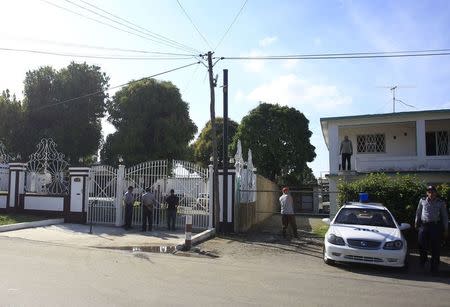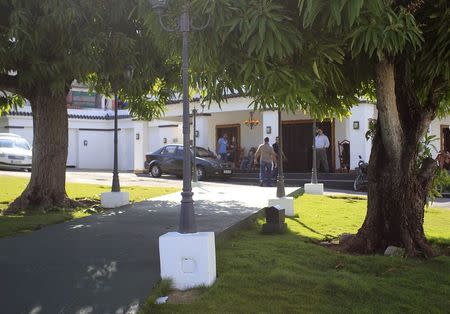Fugitives facing U.S. fraud charges vulnerable under deal with Cuba
By David Adams HAVANA/MIAMI (Reuters) - Gilberto Martinez was almost penniless when he left Cuba in 2005 to start a new life in the United States. Eight years later he returned a rich man and built a large house in his dusty neighborhood on the outskirts of Havana. Flush with money, he drove an Audi and a Mercedes and started a music career under the artistic name "Gilbertman". But two weeks ago, a swarm of Cuban police descended on his home and arrested him. "It was dramatic. There were dozens of cops, in cars, sirens blaring. They blocked off the street," said one neighbor who asked not to be identified. It is not clear what charges the 28-year-old Martinez faces in Cuba but, whatever they are, the U.S. government also wants to bring him in. Florida court records show he is a fugitive and faces up to 16 years in prison after he was indicted on Sept. 30 in a Secret Service credit card fraud probe involving $150,000 of purchases at stores including Toys"R"Us and Babies"R"Us. In recent years, dozens of Medicare, credit card and mortgage fraudsters who came to the United States from Cuba have avoided prosecution by jumping bail and fleeing to their homeland. Under President Obama's new Cuba policy, the fraudsters, who have cost U.S. tax payers hundreds of millions of dollars, could finally come under the long arm of U.S. law. Talks aimed at restoring diplomatic relations after decades of hostility began this week in Havana, and U.S. officials say issues of legal cooperation will be raised in the months ahead. In the past there has been occasional cooperation regarding low level fugitives, including a Florida couple repatriated in 2013 after they kidnapped two small sons they had lost custody of due to a drug arrest and fled to Cuba on a sailboat. "We would hope to be able to expand some of that cooperation in the future as more normal relations go forward, and to have, frankly, a better relationship on that kind of issue," a senior State Department official said this week. "We are starting to compile a list of those fugitives that we believe may have flown back to their native country," said Barry Golden, spokesman for the U.S. Marshals Service in Miami. "But as you can imagine it's very hard to confirm if they are there. It's not like we can call the U.S. embassy and ask them - at least not yet." Not so in the case of Martinez who posted dozens of photos of himself in Cuba on social media. "He's all over YouTube so we can pretty much verify he is there," said Golden, who confirmed that Martinez has an outstanding federal warrant. For days after his arrest, Cuban police were stationed outside his single story hacienda-style home occupying almost an entire block, and several officers were seen inside apparently conducting an inventory. It is not clear why Martinez was arrested or on what charges and no mention was made of the raid in Cuban media. Cuba's government does not usually comment on police actions. ANIMOSITY TO COOPERATION? Their Cold War animosity means Cuba and the United States have no extradition agreement or law enforcement cooperation treaty, although that could change once diplomatic relations are restored. Despite their differences, the two countries have for long cooperated on immigration issues and drug trafficking. But building closer law enforcement ties would still be a huge step in Cuba's one-party system, where the police and the military are under the control of the ruling Communist Party. The most prominent political fugitive in Cuba is Joanne Chesimard who escaped a New Jersey state prison following her life sentence conviction for killing a state trooper in 1973. But there are a host of others wanted for financial crimes. Since 2007, U.S. authorities have been cracking down on Medicare fraud, arresting and charging about 2,000 people who collectively have falsely billed more than $6 billion to the government health program for the elderly and disabled. Most arrests were made in south Florida, often involving Cuban immigrants. "They have got it down to a science ... When they get caught they know they can skip bail and get away to Cuba. It's their business model," said Carlos Fleites, the lawyer for Martinez's girlfriend, Yuleidys Gonzalez Amaral, who is charged in the same credit card fraud case. Fleites said the scale of the problem is hard for Cuba to ignore. "They have to cooperate somewhat if they want to have a normal relationship. They know where everybody is on the island. They could round up everyone overnight and fill a plane and have them in Miami in the morning. Hopefully judgment day is coming." The FBI provided Reuters with a list of 64 south Florida Medicare fugitives, all but six from Cuba, though the number could be higher as some investigations may be under seal. Among them is Jorge Emilio Perez de Morales, wanted on charges he laundered $238 million stolen from Medicare. Three brothers - Carlos, Jose and Luis Benitez - are accused of running 11 Miami-Dade county clinics that swindled $110 million from Medicare. South Florida judges are increasingly taking a harder line on fraud involving recently arrived Cubans, refusing bond and imposing tough jail sentences. Last week, federal Judge Federico Moreno ordered Gonzalez Amaral jailed after she appeared in court on bond to change her plea to guilty and offered to cooperate with prosecutors. "There are too many people who have fled," Moreno said. (Reporting by David Adams; Editing by Kieran Murray)


